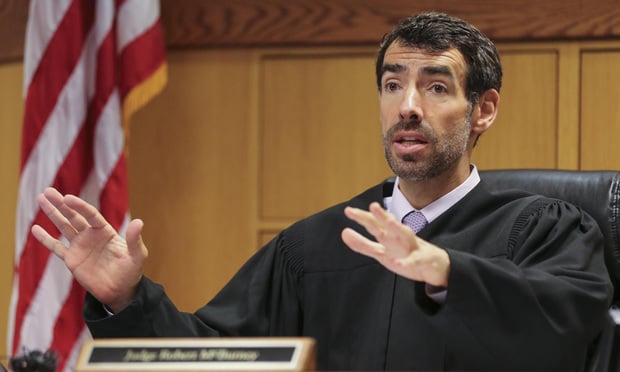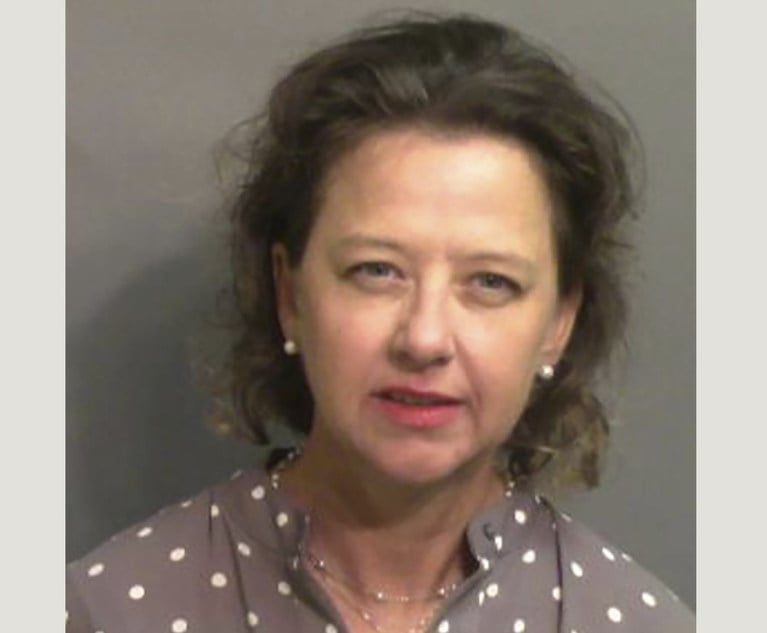Jury Questions Are the Norm in Tex McIver Murder Trial
A Fulton County jury posed 298 questions to witnesses testifying in the ongoing murder trial of Atlanta attorney and former Fisher & Phillips partner Tex McIver. They didn't stop, even after they began deliberating.
April 19, 2018 at 05:51 PM
7 minute read

The blockbuster question late Wednesday hinting at a possible acquittal of Atlanta attorney Claud “Tex” Mciver on charges stemming from the fatal shooting of his wife has not been their only question.
Jurors asked 298 questions of witnesses during 20 days of testimony in McIver's ongoing murder trial. Fulton County Superior Court Chief Judge Robert McBurney has screened all of those questions, some of which he has not allowed.
They have also not shied away from questions during deliberations, which began Tuesday.
The jury asked to reenter the Ford Expedition where McIver shot his wife—this time with McIver's gun. The jury also asked to see a recording of McIver's first interview with Atlanta police three days after the shooting. Their first question after getting the case was to see the Smith & Wesson .38-caliber revolver that fired the fatal shot.
Allowing jurors to ask questions following direct and cross-examination of witnesses is unusual, but it is not unprecedented.
Asked why he was letting jurors pose questions, McBurney replied “Why not?”
McBurney said he decided to adopt the practice after learning that Judge Reggie Walton of the U.S. District Court for the District of Columbia allowed jurors to pose questions to witnesses during the 2007 trial of attorney Lewis “Scooter” Libby, chief of staff to former U.S. Vice President Dick Cheney.
Libby, who was convicted of perjury and obstruction, was pardoned by President Donald Trump last week.
McBurney said Walton also permitted jurors to question witnesses during the 2011 perjury trial of baseball great Roger Clemens.
McBurney said he called Walton, then researched Georgia law and decided “it just might work” here, although he said the practice initially engendered “funny looks” from some of his colleagues.
McBurney said he first allowed the practice during the murder trial of Fernando Hernandez, who was convicted of malice murder and possession of a firearm during the commission of a felony.
In 2016, the state Supreme Court affirmed the practice because juror questions were shared with counsel, who were given an opportunity to object before the questions were asked. The high court also said the questions McBurney posed to the witnesses on the jury's behalf did not improperly convey the judge's opinion. The lawyers were then permitted to pose follow-up questions.
“I think folks seeking the truth ought to be able to do their job,” McBurney said. “It shouldn't be a passive job. Lawyers don't have a monopoly over common sense and what is relevant to a fact-finder's mission.”
If jurors have questions that go unasked, they might Google it themselves, he added. At least one juror picked up on a reference early in the criminal case to a civil trial in which Diane McIver's company was embroiled and in which Tex McIver served as counsel. The jurors wanted to know more, and one juror said it deserved a response or else someone might Google it.
“I'm just stating the obvious,” McBurney said. “If there is a burning inquiry out there, they will look it up.”
McIver attorney Bruce Harvey has objected to the juror questions since the beginning, saying the practice has Sixth Amendment implications regarding a defendant's right to a fair, impartial trial.
“There are questions you may not have asked, particularly by design to fit in with your defense strategy and representation of your client,” he said. “And then a juror may ask that very question, and the judge may say, 'Sure,' which completely undoes that particular strategy you have for that witness.”
Harvey added that the practice also allows the court to interject itself into questioning.
“The Georgia Supreme Court has approved the practice,” he said. “But nobody has raised that critical constitutional implication.”
Assistant District Attorney Clint Rucker said the McIver trial is the first his in 25 years as a litigator that he's fielded jury questions. Rucker called the practice “very insightful for lawyers and very educational for jurors. If it doesn't create unnecessary delay, it can be very helpful.”
Rucker said that, while prosecutors strategize their presentation of the evidence, jurors may not understand it.
“It's like putting together the pieces of a puzzle,” he said. “If jurors are thinking the same way we are … sometimes it's a trigger for me to go further.”
Rucker also took issue with Harvey's Sixth Amendment concerns, saying it's not a violation.
Jurors began asking questions the first week of the McIver trial. By the time the final sleep disorder experts testified, the jury was passing McBurney as many as 20 questions per witness.
One of the first questions—what was the date of the auction of Diane McIver's clothes, antiques and other possessions.
Jurors wanted to know why prosecution sleep expert Mark Pressman said it wasn't possible for someone to wake from a deep sleep, fall back to sleep and immediately slide into dream sleep. They wanted to know why during a sleep study, sensors were placed on the head and chin but not the limbs.
In questioning Emory neurologist and sleep expert David Rye, jurors asked whether alcohol consumption has any effect on REM sleep behavioral disorder or confusional arousal—both conditions McIver was diagnosed with. They wanted to know whether fatigue from physical activity, such as playing 18 holes of golf, could affect an individual's ability to fall into a deep sleep.
They wanted to know if McIver was taking medication for a diagnosed sleep disorder and whether other treatments were recommended or other medical diagnoses made.
The jury also had questions for witnesses who testified about McIver's finances. They wanted to know whether a business partner estimated the value of McIver's investment in a kaolin mining company ranged from $1.5 million to $2.5 million, which McIver cashed out of for $700,000. They also wanted to know if the mining company intended to make an additional payment to McIver that would cover his taxes when he sold his share.
They also repeatedly asked about a $350,000 loan Diane McIver made to her husband in return for mortgaging his share of their ranch and whether he ever paid down the principle or paid off the balance, which was due last year. They also wanted to know whether the court-appointed administrator for Diane McIver's estate could foreclose on Tex McIver's interest in the ranch.
They asked the lead Atlanta homicide detective who investigated the fatal shooting why he said it sounded like an accident before he completed his investigation and whether he was obligated to coordinate with the district attorney. They wanted to know how many cases he worked at any given time.
After crime scene technicians testified about the Ford Expedition, jurors wanted to know why the vehicle was seized by law enforcement for a second time after Atlanta police had returned it to McIver. And they wanted to know where the SUV was.
This content has been archived. It is available through our partners, LexisNexis® and Bloomberg Law.
To view this content, please continue to their sites.
Not a Lexis Subscriber?
Subscribe Now
Not a Bloomberg Law Subscriber?
Subscribe Now
NOT FOR REPRINT
© 2025 ALM Global, LLC, All Rights Reserved. Request academic re-use from www.copyright.com. All other uses, submit a request to [email protected]. For more information visit Asset & Logo Licensing.
You Might Like
View All
Fulton DA Seeks to Overturn Her Disqualification From Trump Georgia Election Case
3 minute read
Glynn County Judge Rejects Ex-DA's Motion to Halt Her Misconduct Trial in Ahmaud Arbery Investigation

Trump Election-Interference Prosecution Appears on Course to Wind Down
4 minute read
Judge Sets Early 2025 Trial for Ex-Prosecutor Charged With Meddling in Ahmaud Arbery Investigation
3 minute readTrending Stories
Who Got The Work
J. Brugh Lower of Gibbons has entered an appearance for industrial equipment supplier Devco Corporation in a pending trademark infringement lawsuit. The suit, accusing the defendant of selling knock-off Graco products, was filed Dec. 18 in New Jersey District Court by Rivkin Radler on behalf of Graco Inc. and Graco Minnesota. The case, assigned to U.S. District Judge Zahid N. Quraishi, is 3:24-cv-11294, Graco Inc. et al v. Devco Corporation.
Who Got The Work
Rebecca Maller-Stein and Kent A. Yalowitz of Arnold & Porter Kaye Scholer have entered their appearances for Hanaco Venture Capital and its executives, Lior Prosor and David Frankel, in a pending securities lawsuit. The action, filed on Dec. 24 in New York Southern District Court by Zell, Aron & Co. on behalf of Goldeneye Advisors, accuses the defendants of negligently and fraudulently managing the plaintiff's $1 million investment. The case, assigned to U.S. District Judge Vernon S. Broderick, is 1:24-cv-09918, Goldeneye Advisors, LLC v. Hanaco Venture Capital, Ltd. et al.
Who Got The Work
Attorneys from A&O Shearman has stepped in as defense counsel for Toronto-Dominion Bank and other defendants in a pending securities class action. The suit, filed Dec. 11 in New York Southern District Court by Bleichmar Fonti & Auld, accuses the defendants of concealing the bank's 'pervasive' deficiencies in regards to its compliance with the Bank Secrecy Act and the quality of its anti-money laundering controls. The case, assigned to U.S. District Judge Arun Subramanian, is 1:24-cv-09445, Gonzalez v. The Toronto-Dominion Bank et al.
Who Got The Work
Crown Castle International, a Pennsylvania company providing shared communications infrastructure, has turned to Luke D. Wolf of Gordon Rees Scully Mansukhani to fend off a pending breach-of-contract lawsuit. The court action, filed Nov. 25 in Michigan Eastern District Court by Hooper Hathaway PC on behalf of The Town Residences LLC, accuses Crown Castle of failing to transfer approximately $30,000 in utility payments from T-Mobile in breach of a roof-top lease and assignment agreement. The case, assigned to U.S. District Judge Susan K. Declercq, is 2:24-cv-13131, The Town Residences LLC v. T-Mobile US, Inc. et al.
Who Got The Work
Wilfred P. Coronato and Daniel M. Schwartz of McCarter & English have stepped in as defense counsel to Electrolux Home Products Inc. in a pending product liability lawsuit. The court action, filed Nov. 26 in New York Eastern District Court by Poulos Lopiccolo PC and Nagel Rice LLP on behalf of David Stern, alleges that the defendant's refrigerators’ drawers and shelving repeatedly break and fall apart within months after purchase. The case, assigned to U.S. District Judge Joan M. Azrack, is 2:24-cv-08204, Stern v. Electrolux Home Products, Inc.
Featured Firms
Law Offices of Gary Martin Hays & Associates, P.C.
(470) 294-1674
Law Offices of Mark E. Salomone
(857) 444-6468
Smith & Hassler
(713) 739-1250






